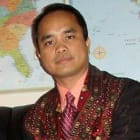commentary Commentary
Commentary: With violent crackdowns, is Myanmar passing the point of no return?
Moving towards a peaceful resolution of the crisis is the only way forward for sense to prevail, says Nehginpao Kipgen.
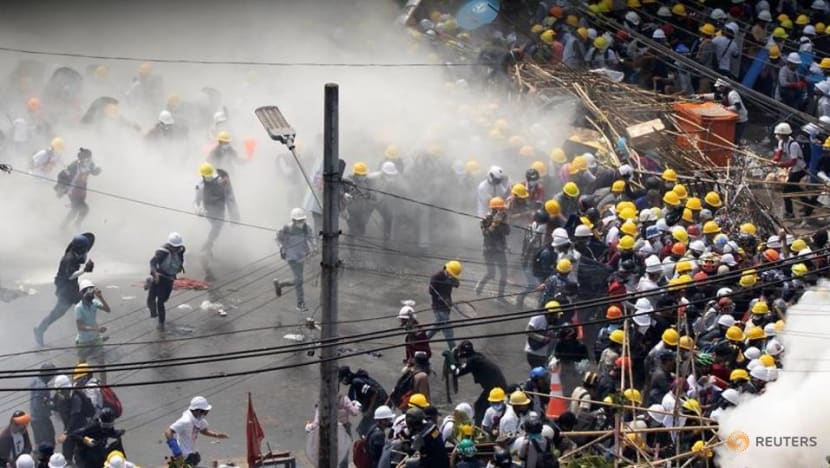
Tear gas and fire extinguisher gas float around demonstrators during a protest against the military coup in Yangon, Myanmar, March 2, 2021. Picture taken from behind a window. (Photo: REUTERS/Stringer)
SINGAPORE: The ASEAN Foreign Ministers have weighed in heavily on developments in Myanmar, emphasising values of democracy, respect for human rights and the need for the grouping to reach a common position.
Foreign Minister Vivian Balakrishnan warned on Tuesday (Mar 2) that failure by the group to reach a common position on matters in this region would mean individual member states will be forced to state their own position.
He understands that the situation in Myanmar has rapidly deteriorated, with at least 18 deaths alone on Sunday as soldiers reinforced police and live ammunition was fired into crowds in places across the country. Over a thousand people have also been arrested, including political leaders, journalists and artists.
And observers watching events unfold know something must be done before Myanmar becomes a powder keg for further violence.
READ: Commentary: Has Myanmar coup sparked rethinking on non-interference among ASEAN countries?
MILITARY STILL IN CHARGE
But the sad truth is, regardless of international pressure and heightened media scrutiny, the Myanmar military alone holds the keys to how events will play out.
The military is the single most powerful institution in the country that has ruled the country for decades.
With 516,000 personnel including over 400,000 in active service, it was ranked the fourth most powerful armed forces in Southeast Asia by the 2017 Global Firepower Index. Together with the Myanmar police, it has a monopoly on force in the country.
Commander-in-chief Senior General Min Aung Hlaing has also assumed all powers of the government - executive, legislative and judiciary – in forming the State Administrative Council (SAC), which Min Aung Hlaing chairs.
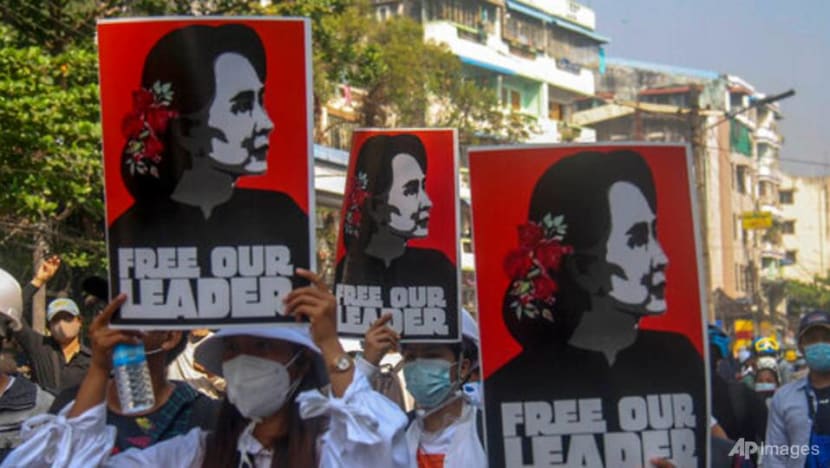
Still, things are getting out of hand where curfews and limits on gatherings have been imposed to no avail, leading security forces to use water cannons, rubber bullets and now, live ammunition, to disperse protesters.
LOSING LEGITIMACY
The violent crackdown on Sunday has lost the military legitimacy. This is a new development.
Although its role in national politics all these years has been controversial, the military had been seen by many Myanmarese as defenders of the country’s sovereignty and public safety, in protecting them against perceived terrorist attacks by the Arakan Rohingya Salvation Army, up until the coup.
This rapid deterioration has hardened the stances of protesters and is leading the situation to spiral into an all-or-nothing-at-all challenge on which side prevails: Aung Sang Suu Kyi and the National League for Democracy (NLD) or the military and coup supporters.
The loss of lives, use of violence and intimidation tactics are souring sentiments.
READ: Commentary: A crackdown in Myanmar could spark a humanitarian crisis
It was bad enough that protesters had regarded charges against ousted leader Aung San Suu Kyi - from illegal possession of walkie talkies, violation of natural disaster law, and most recently the publication of information causing fear or alarm, and breaching of telecommunications law requiring licenses for equipment – as frivolous excuses for locking up a national icon.
They think the military may be preventing Aung San Suu Kyi from ever assuming political office again or running in elections. After all, the military pursued a similar strategy by detaining her for nearly 15 years.
READ: Commentary: How Myanmar’s military leveraged the COVID-19 pandemic in its power grab
The lack of a timeframe for elections to be pursued has also been glaring, stoking suspicions the military is only concerned with holding onto power despite reassurances they are acting in accordance with the 2008 constitution.
Even the new election commission established in early February is geared towards investigating electoral fraud allegation, with arrests made of the previous election commission that oversaw the November 2020 polls.
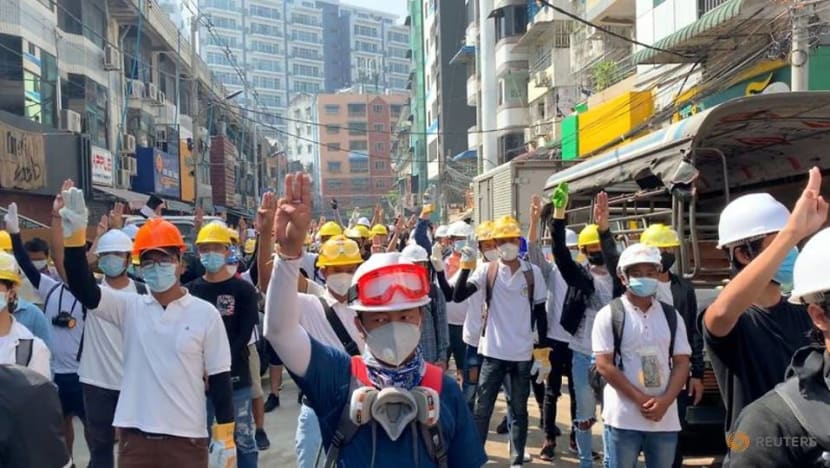
Myanmar is moving further away from normalcy. Since the coup, thousands of civil servants, railway workers, doctors, nurses, teachers and others have joined or supported the protests, with many arrested.
Banks, private healthcare and other services have shuttered offices or slowed operations to comply with restrictions on crowds.
READ: Commentary: To be president? What Myanmar military leader's endgame may be
A PATH TOWARDS RECONCILIATION
All is not lost. In its effort to garner wider public support, the military has inducted leaders from the ethnic minority groups and a wide range of political parties to be part of its SAC.
The list includes Mahn Nyein Maung, formerly from the Karen National Union, Saw Daniel, a former vice-chairman of the Kayah State Democratic Party, along with Thein Nyunt and Khin Maung Swe, co-founders of the National Democratic force, a splinter group of the NLD.
It knows its ability to run the entire country has been severely hampered by the ongoing civil disobedience.
READ: Commentary: US sanctions on Myanmar will not reverse the coup
The violence must end but compromise will be needed from both sides. Protesters against the coup have argued that the international community should reject the junta and refrain from dealing with it, but that may be a myopic approach. The military will not give up without a strong fight.
A complete surrender with a reversion to the pre-coup status quo may be wishful thinking.
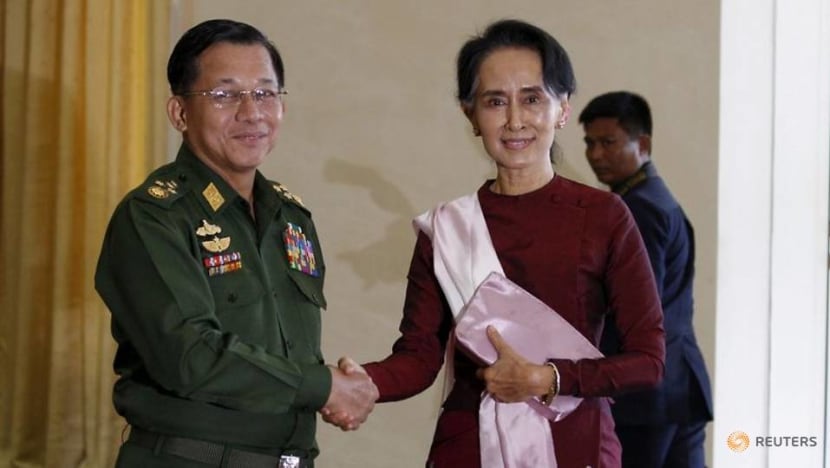
It is admittedly difficult to imagine a dialogue between the military and the NLD leadership at this point. Here, the role of ASEAN can be vital.
The stage has been set. The bloc’s chairman called for a peaceful resolution through constructive dialogue, during that same meeting of the ASEAN Foreign Ministers on Tuesday. Members also highlighted the importance of a return to peace and normalcy.
While Western countries and international institutions impose sanctions on the military, ASEAN must engage both the military and the NLD leadership to facilitate some sort of a political arrangement.
READ: Commentary: ASEAN can do better on Myanmar this time
An independent commission to investigate claims of voting irregularities could give the military a face-saving way out, if both sides can agree to work towards a peaceful resolution of the impasse.
I would also not rule out the possibility of fresh elections to be held under the supervision of international observers, including the United Nations, ASEAN and others mutually agreed upon by both the military and the NLD.
Dr Nehginpao Kipgen is a Political Scientist, Associate Professor and Executive Director at the Center for Southeast Asian Studies, Jindal School of International Affairs, O P Jindal Global University. He is the author of three books on Myanmar, including Democratization of Myanmar.








